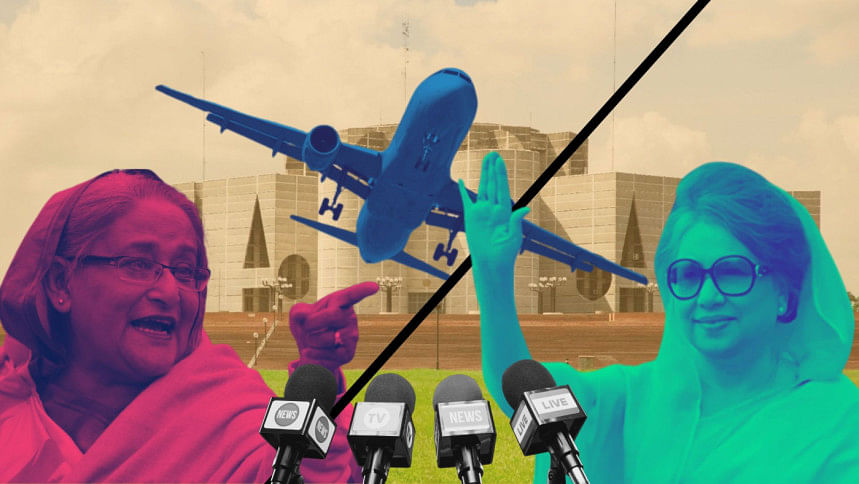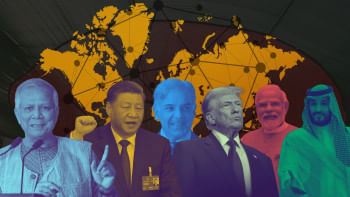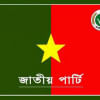The power of silence in a bitter political rivalry

BNP Chairperson Khaleda Zia boarded a flight to the UK for medical treatment a few hours after her scheduled departure. The delay was caused by the thousands who thronged the highway to bid her farewell. The ensuing traffic jam inconvenienced commuters, no doubt, but it was an outpouring of love and support from her admirers and followers. On the same day, the Bangladesh government revoked 97 passports, including that of former Prime Minister Sheikh Hasina, who is now exiled in India, having fled after a massive political upsurge.
Just six months ago, the tables were completely turned. Khaleda was under house arrest, while her party was desperately appealing for her to be allowed to travel for medical care. The request was denied many times. Meanwhile, Sheikh Hasina held an iron grip on power, with no one daring to challenge her.
Since Hasina's government came to power, Khaleda had endured relentless verbal attacks but remained largely silent, maintaining a quiet dignity even as Hasina's words often struck with sharp venom. The two women, both giants of Bangladesh's political landscape, share a bitter rivalry, yet their communication styles couldn't be more different—Hasina is known for her fiery, often harsh tone, while Khaleda is known for remaining calm and calculated, rarely engaging in public verbal sparring.
Khaleda Zia's troubles began in 2009 when her archrival Hasina assumed office. The first blow came when Khaleda was forcibly evicted from her Dhaka cantonment house, which she had called home for decades. In a tearful press conference at her Gulshan office, Khaleda accused the government of dragging her out of her bedroom, breaking down her door, and leaving her with nothing but the clothes she was wearing. Awami League leaders, including Hasina herself, dismissed her emotional plea as nothing more than "crocodile tears."
The political climate grew more hostile. On December 29, 2013, as the BNP declared its "March for Democracy" ahead of the controversial January 5, 2014, elections, Khaleda's path was blocked by five sand-laden trucks ordered by the government to prevent her from attending the rally. The sight of the trucks—now infamous in Bangladesh's political history as "sand-truck democracy"—left Khaleda frustrated and powerless. It was the first time she was out of parliament since she began parliamentary politics in 1990. While she was visibly upset, her fury was directed not at Hasina but at the female police officers who had managed to irritate her. In a brief moment of exasperation, Khaleda lashed out in a rare outburst. The only other time Khaleda appeared ungracious was when Hasina wanted to offer condolences for the death of Arafat, Khaleda's younger son. The sitting prime minister was turned back from the locked gates of Khaleda's Gulshan house.
Khaleda's journey took an even darker turn when she was imprisoned on corruption charges filed during the army-backed caretaker government. Meanwhile, Hasina, when she came to power, had all charges against her cleared, even as Khaleda languished in Dhaka Central Jail. Hasina, ever vocal, repeatedly mocked Khaleda, calling her a "thief" and claiming she deserved the punishment she received. Hasina would often declare, while mocking the BNP's political efforts: "Now they're marching for a thief."
Ironically, however, the international media has reported massive corruption allegations against Hasina's cabinet and even her niece, who is a British MP.
Hasina even issued threats that any attempt by the BNP to step up its movement would result in Khaleda being thrown back into prison, deepening the political animosity between the two women and fuelling a bitter feud that shaped Bangladesh's political landscape. Even after sending her to jail, Hasina did not refrain from making harsh comments. Earlier in 2022, she even remarked that Khaleda Zia should be "thrown" off the Padma Bridge. At a programme in London in October 2023, Hasina further said, "Khaleda Zia is over 80 years old, and there is news every day that she is on the verge of dying." She then questioned the point of crying over her health.
Hasina's ungracious comments weren't limited to Khaleda. She also targeted other prominent figures, including Muhammad Yunus, who is currently the chief adviser to the interim government. She infamously labelled Yunus a "bloodsucker of the poor." Moreover, during the student protests in late July, Hasina's reaction was far from empathetic. Instead of listening to the youth's grievances, she blamed the students and ordered the police to crack down hard on the protesters.
Ultimately, Hasina was forced to flee the country. Despite her repeated declarations that she would never leave, she fled Bangladesh in the face of mass public anger, abandoning millions of her party loyalists who were left in disarray.
On the other hand, Khaleda Zia departed the country amid a spontaneous farewell fit for a respected leader after years of hardship. Despite that, Khaleda chose not to lash out against Hasina. Instead, she called for "no destruction, no anger, and no revenge," urging the need for love and peace to rebuild the nation.
In a world where silence hardly prevails, Khaleda Zia's restraint became her strength. When the autocratic regime sought to break her, it was the people who showered her with love. This quiet yet powerful defiance set her apart from others.
Where others saw defeat, Khaleda saw an opportunity. As Hasina fled in the face of overwhelming public dissent, Khaleda was met with the kind of love and support that transcended years of political conflict. In choosing peace over revenge and dialogue over destruction, she set an example that speaks louder than words.
Of all the five major political figures in Bangladesh's history—Sheikh Mujibur Rahman, Ziaur Rahman, HM Ershad, Khaleda Zia, and Sheikh Hasina—it is only Khaleda Zia who has managed to avoid the label of an autocrat. This distinction is a significant defining aspect of her political legacy.
At a time when politics often rewards the loudest voice, Khaleda Zia's legacy serves as a reminder that silence, too, can be golden. It is this quiet strength that will echo through Bangladesh's history, ensuring that she is not just remembered but also revered.
Mohammad Al-Masum Molla is a journalist of The Daily Star.
Views expressed in this article are the author's own.
Follow The Daily Star Opinion on Facebook for the latest opinions, commentaries, and analyses by experts and professionals. To contribute your article or letter to The Daily Star Opinion, see our guidelines for submission.

 For all latest news, follow The Daily Star's Google News channel.
For all latest news, follow The Daily Star's Google News channel. 










Comments